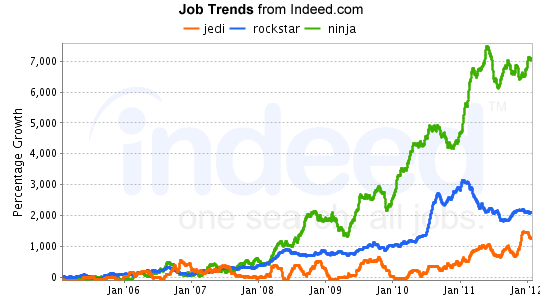Job titles are getting stranger by the hour
It might be fun as heck to tell your friends that you’re a professional rock star, but attracting others with that title might seriously complicate the recruiting process.
According to a search of Indeed.com, somewhere in America, 57 Jedi will be hired over the coming months. Who said there’s a recession?
Alongside the incoming classes of rock stars and Ninjas (677 and 484 respectively), these Jedi will find themselves atop the very pinnacle of gainfully employed geekdom. And it’s awesome to have a fun job title. But what happens if the perfect hire only happens to search for “Front-End Developer?” You might miss them completely.
Exposure, or attitude?
Would a ninja by any other name code with quiet fury?
Be hilarious with your job titles and descriptions. Write your description in Pig Latin – backwards. I’m not saying to hide your company’s spirit, but be aware that there can be a tradeoff between exposure and attitude.
It’s very similar to SEO (search engine optimization). The more targeted the language in your job description, the more your reach will (naturally) decrease. Obviously targeting has its advantages, such as sending a clear signal that your company is a fun place to work. Managing keywords within your job postings can be just as important as managing them on your website.
 The more obscure your titles, the greater chance you have of attracting too few applicants. Or worse yet, the greater chance you have of missing out on the perfect hire.
The more obscure your titles, the greater chance you have of attracting too few applicants. Or worse yet, the greater chance you have of missing out on the perfect hire.
Study your keywords and optimize
Know what jobs your target audience is searching for. Know what keywords your competitors are using. Spend some time benchmarking others in your industry as well as others hiring the same types of workers.
To help your research, many job boards offer free resources for analyzing trends in job postings. Use Job Trends, by Indeed, to gauge competition on each keyword.
Be aware of popular terms and try to include them organically in your postings. Most job boards seem to return hits based on the title first but definitely include matches from the body of a job description, so they’re important as well.
Just like SEO and SEM (search engine marketing), there are advantages to “bidding” on long-tail keywords – those that receive less attention, but ones that you could come to dominate. When someone searches for “Vector Graphics Velociraptor” and only your jobs come up, you have a considerable advantage. That population might be rather small, though.
Your success is how well you manage this tradeoff.
Test your keywords and adjust accordingly
When you think you’ve arrived at a great position title and job posting, send it to as many free job boards as possible. We like Indeed and SimplyHired, but there are many more out there with varying levels of specialization.
Track the quantity and quality of the applicants you get with each set of keywords. If you aren’t attracting enough applicants, try shifting to a new set of keywords or including others in your posting.
If popularity is any indicator of success, looking for ninjas might be the right approach for some companies.
However, Jedi and rock stars might not be a great call for your openings, what with all of the flying nunchaku and constant noise. With smart planning and benchmarking, you can get it right from the start. SEO, meet JPO – Job Posing Optimization.
This article originally appeared on The Resumator Blog.
